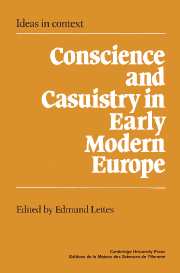Book contents
- Frontmatter
- Contents
- Notes on contributors
- Introduction
- 1 Governing conduct
- 2 Laxity and liberty in seventeenth-century English political thought
- 3 Casuistry and character
- 4 Prescription and reality
- 5 The ‘new art of lying’: equivocation, mental reservation, and casuistry
- 6 Kant and casuistry
- 7 Moral arithmetic: Seven Sins into Ten Commandments
- 8 Optics and sceptics: the philosophical foundations of Hobbes's political thought
- Index
3 - Casuistry and character
Published online by Cambridge University Press: 13 October 2009
- Frontmatter
- Contents
- Notes on contributors
- Introduction
- 1 Governing conduct
- 2 Laxity and liberty in seventeenth-century English political thought
- 3 Casuistry and character
- 4 Prescription and reality
- 5 The ‘new art of lying’: equivocation, mental reservation, and casuistry
- 6 Kant and casuistry
- 7 Moral arithmetic: Seven Sins into Ten Commandments
- 8 Optics and sceptics: the philosophical foundations of Hobbes's political thought
- Index
Summary
As it was understood in medieval and early modern Europe, the study of ‘cases of conscience’ – what is today called ‘casuistry’ – was the resolution by expert minds of difficult moral cases. This was a form of analysis which received massive support from the Roman Catholic Church from the thirteenth century onwards. Numerous casuistical manuals were produced, often designed to aid the priest faced with the challenge of guiding the individuals who came to him in confession.
The church also sought to judge institutional practices, including its own, and in these matters, too, it called for the aid of casuists. For centuries, important members of the faculties of many distinguished universities devoted themselves to the moral analysis of issues in all conceivable areas of contemporary life – from matters of finance to relations between parents and children, from the treatment of Indians in the New World to the degree of sinfulness in masturbation. The Protestant Reformation did not put a halt to the demand for church-sponsored casuistry. Sixteenth-century Lutheran Germany produced a large body of casuistical literature. During the first sixty years of the seventeenth century, English Protestants also wrote and read a great deal of the same sort of writing.
By the first decades of the eighteenth century, however, casuistical literature produced by the clergy was no longer an important force in the religious, intellectual, and moral life of Protestant England. McAdoo writes that from 1660 to 1700, it ‘vanished off the [English] theological map’ with ‘incredible speed’.
- Type
- Chapter
- Information
- Conscience and Casuistry in Early Modern Europe , pp. 119 - 133Publisher: Cambridge University PressPrint publication year: 1988
- 6
- Cited by



